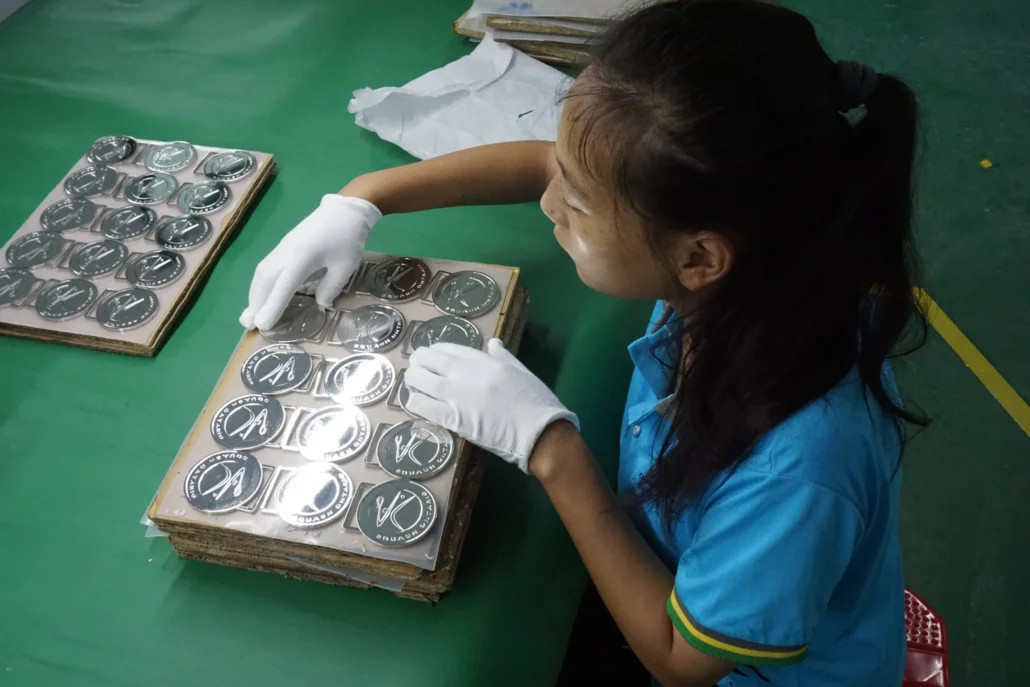Wählen Sie das richtige Material für die Herstellung einer Wandermünze
Wählen Sie ein geeignetes Material für die Herstellung einer Wandermünze.
- Messing
- Eisen
- Zink
- Gold
- Silber
- Bronze
- Kupfer
- Nickel

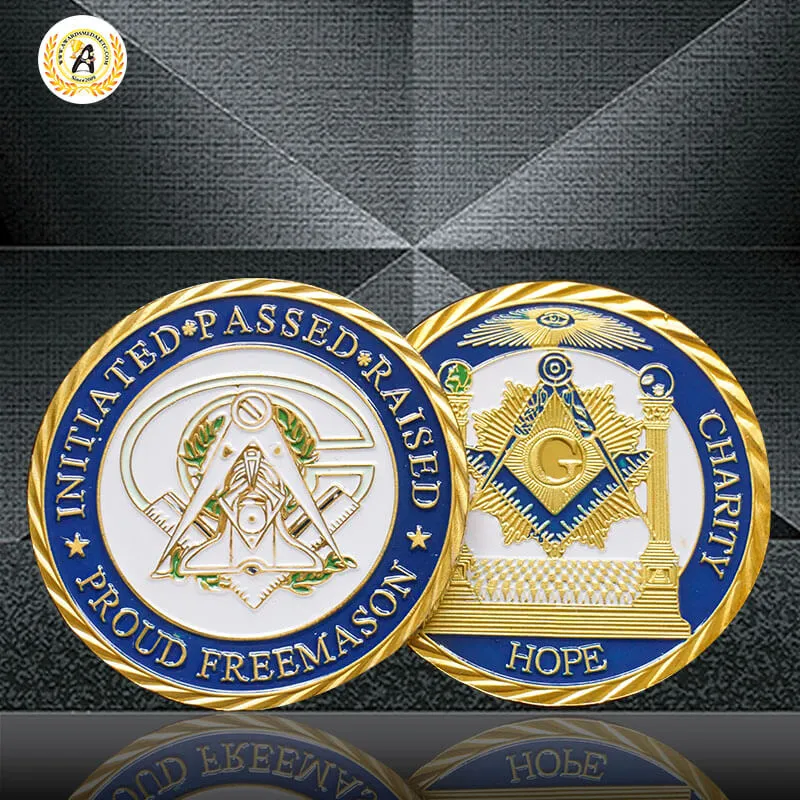
Individuelles Verfahren für Wandermünzen
Das Verfahren für die Herstellung von Sondermünzen besteht aus 9 Schritten. Befolgen Sie diese Schritte, um Ihre Herausforderung Münze zu machen.
1. Herstellung der Form
Bei der Herstellung von Sondermünzen beginnt die Bildplatzierung in der Software.
Anschließend liest die CNC-Maschine den Entwurf und fräst das Motiv der inversen Münze beidseitig in einen Stahlstempel.
Die Hersteller stellen sicher, dass das Design der Wandermünze genau ist. Anschließend wird die Form gehärtet, um ihre Festigkeit zu prüfen.
Gussformen prägen die Münze. Durch die richtige Platzierung der Münze in der Form wird das Bild ohne jegliche Abweichung gedruckt.
2. Matrize schlagen
Jetzt wird die Münze mit Hilfe von Druckstempeln auf eine leere Münze geprägt. Dabei wird nicht nur das Bild gedruckt, sondern es werden auch erhabene Elemente hinzugefügt, die für mehr Tiefe und Gefühl sorgen. Der Prozess wird wiederholt, um das gewünschte Design und die Details zu erreichen.
3. Option Einfassung
Die Umrandung von Sondermünzen sorgt für mehr Einzigartigkeit. Sie können Randoptionen wie Rautenschnitt, schräge Linie, Spornschnitt usw. anpassen.
4. Entgraten und Polieren
Der Rand der Sondermünze bleibt nach dem Prägevorgang scharf. Durch Entgraten werden die scharfen Kanten entfernt,
Als nächstes folgt der Poliervorgang. Eine polierte Wandermünze ist antikorrosiv und verhindert das Anlaufen. Die Münze wird mit Polierscheiben und einer Polierpaste poliert. Allerdings variiert die Art der verwendeten Verbindung zwischen den verschiedenen Metallen.
Eine Diamantmischung poliert Weißmetall und rostfreien Stahl. Gleichzeitig poliert eine Rouge-Mischung Messing und gelbe Metalle.
5. Münzplattierung
Das Beschichten von Münzen ist der wichtigste Teil des Münzherstellungsprozesses. Es liefert die Münzen mit billigem Material und dem gleichen Gefühl und Aussehen.
Bei diesem Verfahren werden Eisen und Zink als Grundmaterial für die Münze verwendet. Später wurde eine dünne Schicht aus Gold, Silber, Kupfer usw. aufgetragen, um das gewünschte Aussehen zu erzielen.
6. Metall-Strukturierung
Es handelt sich um ein zusätzliches Merkmal, das die Textur unter dem benutzerdefinierten Design der Wandermünzen hervorhebt. Münzen sind in der Regel strukturierte oder raue Oberflächen, je nach Wahl.
7. Münzfärbung
Im Gegensatz zu einer Münze mit natürlicher Farbe sieht eine gefärbte Münze stilvoller und individueller aus. Hier sind drei Schritte zum Färben von Münzen:
Harte Emaille: Zum Auftragen von Farbe auf die Oberfläche der Münze
Weiche Emaille: Bringt Farbe in die vertieften Bereiche der Münze ein
Tampondruck: Bringt Tinte auf die Münze auf, um eine dauerhafte Farbschicht zu erzeugen.
8. Lasergravur
Bei der Lasergravur wird ein winziges Muster auf dem Münzboden und den Rändern angebracht. Bei der Lasergravur wird das Aussehen der Münze durch Text auf der Oberfläche oder an den Rändern aufgewertet. Eine Lasergravur an den Seiten macht die individuellen Münzen noch attraktiver.
9. Veredelungsprozess
Designprüfungen, Aussehen, Haptik und Haltbarkeit bilden den Abschluss der individuellen Herausforderung.
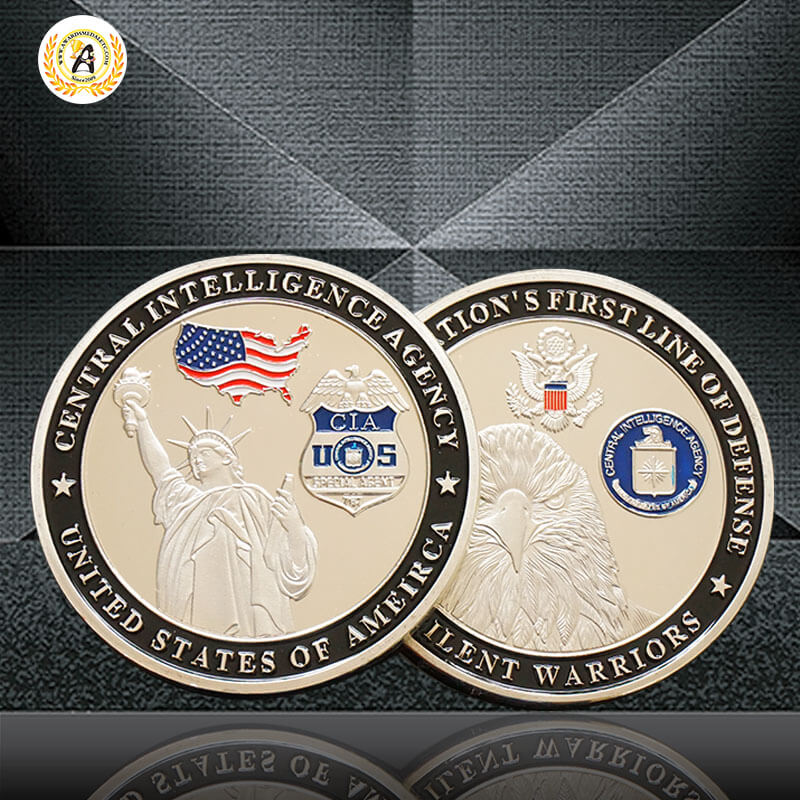
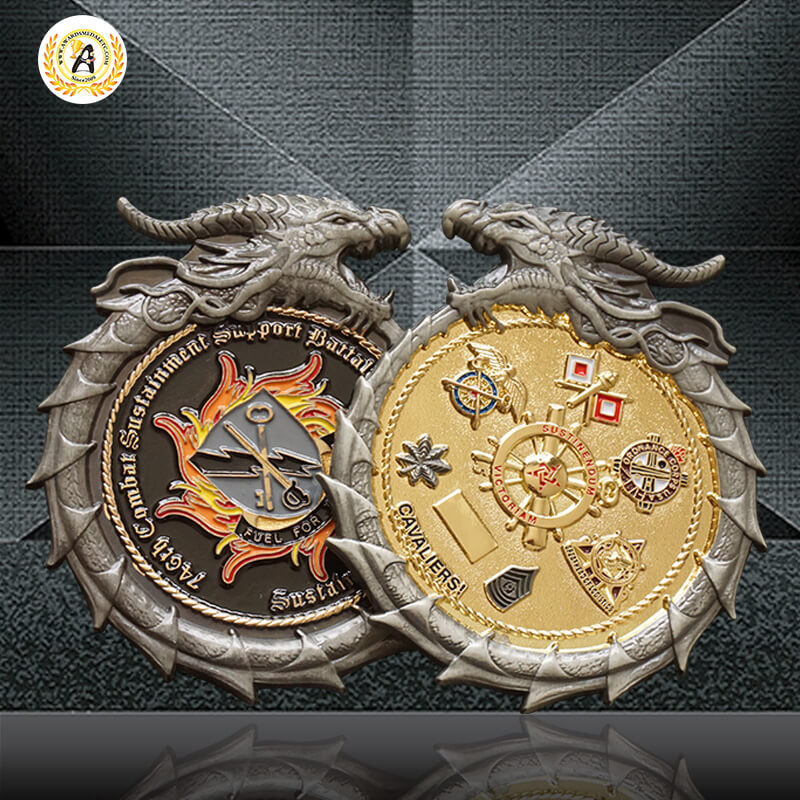
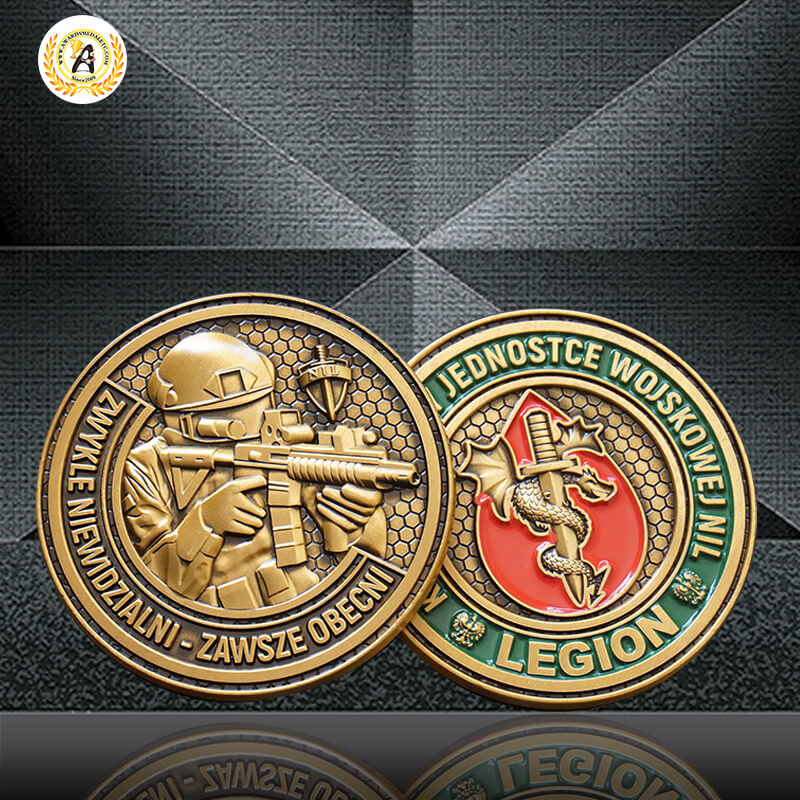
Individuelle Wandermünzen: Möglichkeiten der Kreativität
Im Folgenden finden Sie die vier verfügbaren Anpassungsoptionen für die Entwicklung einzigartiger individueller Wandermünzen.
1. die Kantengravur
- Standard-Flachkante
- Kante des Seils
- Spornvorsprung
- Kette Rand
2. Oberflächenbeschaffenheit
- Glatt: bietet eine glatte Münzoberfläche und ist auf Hochglanz poliert.
- Sandgestrahlt: bietet eine strukturierte oder matte Oberfläche mit einem frostigen oder körnigen Aussehen.
- Antik: Verleiht ein gealtertes oder verwittertes Aussehen.
- Diamantgeschliffene Kante: Rillen im Randbereich der Zoll-Wandermünzen.
- Weicher Schmelz: Bietet eine erhabene Textur
- Epoxid-Beschichtung: Bietet eine glatte, glänzende Beschichtung zum Schutz der darunter liegenden Designelemente.
- Geformte 3D-Textur: Bietet erhabene Bereiche auf der Münze, die Tiefe im Design schaffen.
3. Muster Farben
- Antike Beschichtung: Herausforderungsmünzen haben weniger Reflexion. Es bietet auch natürliche Schatten und Schattierungen in den erhöhten und vertieften Bereichen.
- Hochglanzplattierung: Die Hochglanzbeschichtung sorgt für lesbare Elemente und erhält die Haptik.
- Doppelte Beschichtung: Bietet eine Kombinationsmöglichkeit von zwei oder mehr Beschichtungen. Dieses Gleichgewicht von Mix und Match führt zu auffälligen Farben, die sich nicht nur auf Farbfüllungen stützen.
4. 3D-geformtes Detail
Dazu gehören 3-dimensionale Details wie Fahrzeuge, Menschen, Berge usw.
5. Wert und Attraktivität für die persönliche Anpassung
Die für eine Organisation entworfenen Sondermünzen sind mit bestimmten Motiven und Zielen verbunden. Sondermünzen können ein Ereignis oder eine Geschichte über den unermüdlichen Einsatz des Inhabers darstellen.
Qualitätskontrollen bei Sondermünzen
Nach der Herstellung von Sondermünzen werden mehrere Qualitätskontrollen durchgeführt, um die Einhaltung der Standards zu gewährleisten.
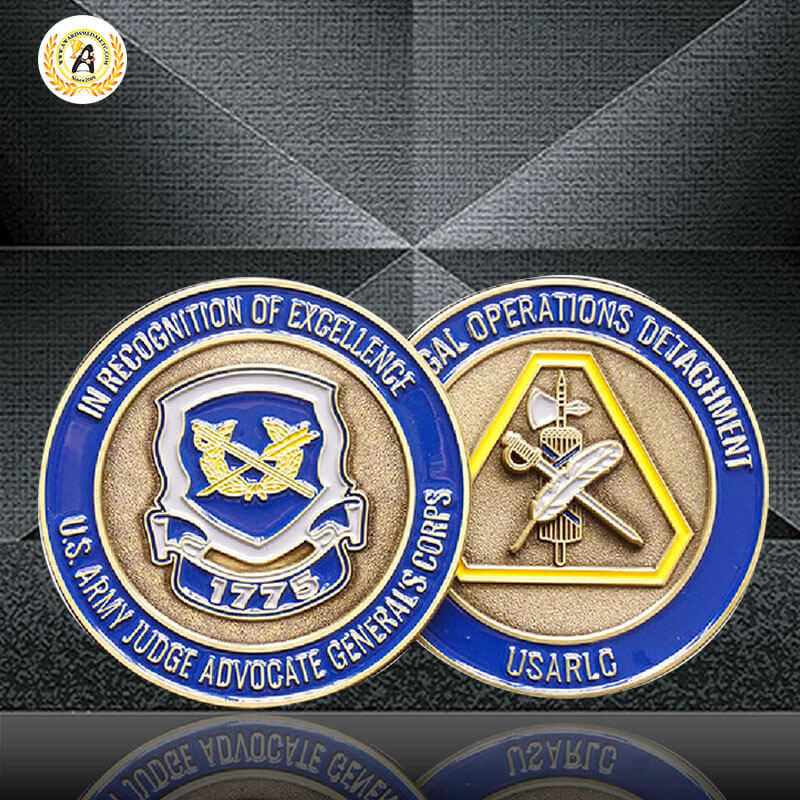
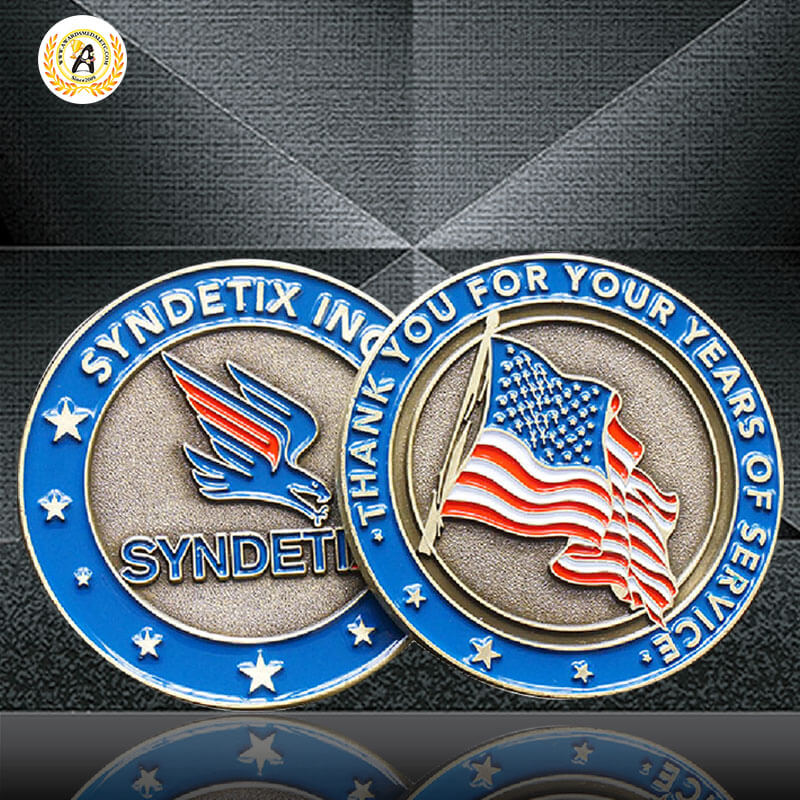
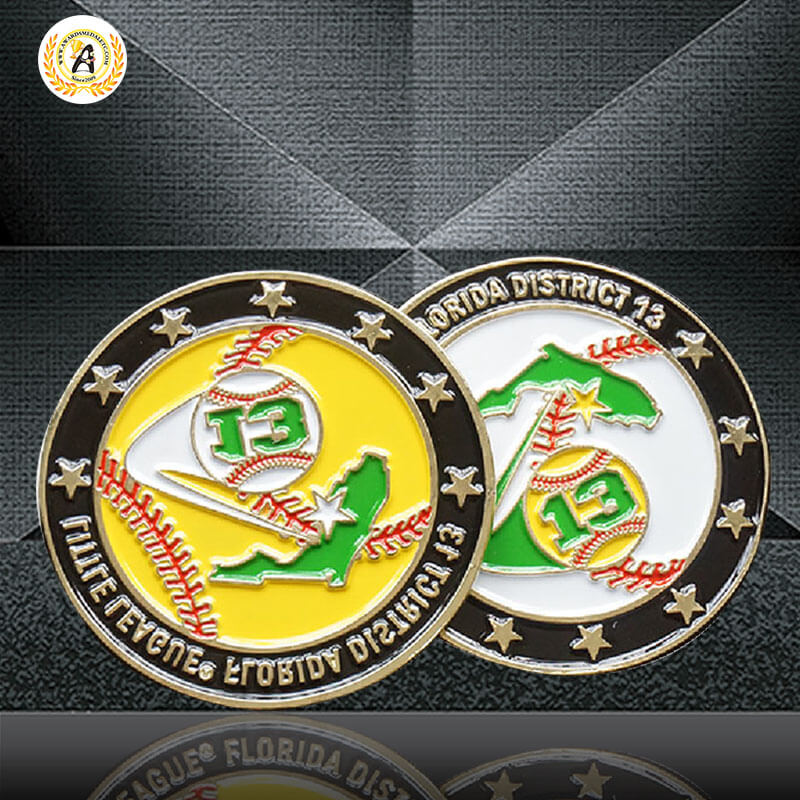
Liefermethode und Zeitplan
Sondermünzen werden auf unterschiedliche Weise angeboten und unterliegen bestimmten Regeln. Die Arten von Sondermünzen und die Anlässe beeinflussen die Regeln. Hier sind einige beliebte Arten der Übergabe von Sondermünzen:
Methode
- Händeschütteln: Der Geber schüttelt dem Empfänger die Hand und reicht sie von einer Hand zur anderen
- Präsentation: Der Geber hält eine Rede, bevor er sie übergibt.
- Münzprüfung: Auch benutzerdefinierte Herausforderungsmünzen können jederzeit von jedem Gruppenmitglied "herausgefordert" werden. Um einen Münz-Check zu starten, wirft ein Mitglied seine Münze auf den Tisch, um eine Herausforderung auszusprechen. Alle anderen Anwesenden müssen dann ihre Münze vorlegen. Wenn jemand nicht zahlt, kann er eine Runde Getränke ausgeben oder eine andere vereinbarte Aufgabe erfüllen.
- Post oder Paket: Per Post zugestellt oder in einem Paket geliefert.
- Zeremonie mit individuellen Wandermünzen: Wandermünzen werden in Zeremonien angeboten.
Zeitleisten
Faktoren wie Qualität, Designkomplexität usw. wirken sich auf die Lieferfrist aus. Im Folgenden finden Sie eine ungefähre Vorstellung von den Lieferfristen für Wandermünzen:
- Entwurf und Genehmigung: 1-2 Wochen
- Produktion:2-4 Wochen
- Versand: 1-2 Wochen.
- Gesamtzeitraum: 4-8 Wochen
Vom Entwurf der Münze bis zur endgültigen Auslieferung gibt es mehrere Schritte, um eine Herausforderung zu schaffen. Wenn eine Münze alle Schritte durchläuft, erhalten Sie eine optisch ansprechende, qualitativ hochwertige Wandermünze.
Individuelle Wandermünzen sind von großer Bedeutung für Anerkennung und Gedenken. Sie fördern ein Gefühl des Stolzes, erinnern an gemeinsame Erlebnisse und stellen Motivation dar. Sie zeugen von unverbrüchlicher Verbundenheit und zeigen Wertschätzung.
Was kommt als Nächstes?
Sind Sie bereit, noch heute Ihre individuelle Wandermünze zu besitzen? Kontaktund lassen Sie sich von uns dabei helfen, Ihre Vision mit einer exklusiven und einzigartigen Sondermünze zu erzählen.
